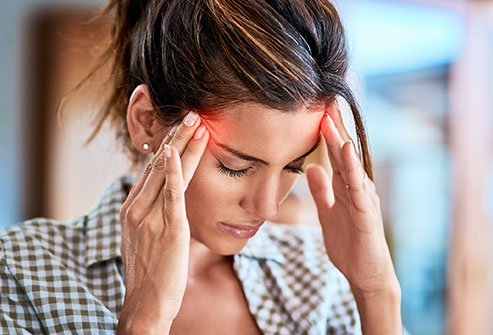
Migraine is a serious disease, more common than diabetes, epilepsy and asthma combined. An attack most often involves a throbbing headache, sometimes localized on one side, which may be accompanied by sensitivity to light, sounds, or smells, and be accompanied by nausea, vomiting, and blurred vision.
Current research suggests that migraine patients have an imbalance between the areas of the brain that process pain, which may be responsible for increased sensitivity to irritants. Repeated attacks lead to functional and structural changes in the brain that contribute to the transformation of migraine into its chronic form.
An important place in the phenomenon of this disease is occupied by psychological factors that make it possible to consider migraine as a psychosomatic problem. The so-called "migraine type of personality" is described, which is characterized by increased sensitivity to stress factors, a high level of anxiety, ambition, diligence, rigidity, responsibility, and a tendency to steadfastly adhere to generally accepted norms of behavior. Such patients, in response to pain effects, more often use such non-adaptive strategies for coping with psychological stress, such as catastrophization and self-accusation, which leads to even greater subjective experience of pain.
Also, family, socio-economic and cultural factors experienced in the past psychotraumatic life events can predispose to the development of chronic pain syndrome. The most significant psychological consequence of prolonged and intense pain is the loss of that basic trust in the world, which allows a person to by default build relationships with other people and build a long life perspective. This leads to a reduction in individual life prospects, forming the psychological "soil" of chronic depression. That is why psychotherapy must necessarily be included in the treatment of migraine.
A good non-drug treatment for migraine is transcranial electrical brain stimulation (TES). It is widely used to relieve headaches of various origins due to its analgesic effect, and also has a positive effect on the processes of reparation and an increase in the psychophysiological status of a person. Studies show, efficiency, absence of side effects and reduced dependence on drugs allows the use of TES in complex therapy.
It was recently discovered that ketamine infusions, already proven effective in the treatment of depression and chronic pain, can also quickly slow down and prevent migraine attacks.
Scientists have shown a violation of the ratio of "excitatory" and "inhibitory" neurotransmitters in migraine, in particular the neurotransmitter glutamate, the excessive release of which is involved in the mechanisms of pain. It is his receptors that ketamine blocks, reducing pain signals. This unique “rewiring” ability allows ketamine not only to stop the pain of an attack within minutes, but also to reduce its recurrence in the future.
Dr. Carlos Zarate, Chief Scientist at the US National Institute of Mental Health, says that with ketamine, "we can help migraines within hours."
Due to the fact that each person is unique and different both physiologically and psychologically, it is obvious that treatment should be individualized. That is why we tailor the most appropriate treatment for each patient, which allows the patient to gradually get rid of the symptoms, and some for the first time in many years resume the vital activity that they have missed for so long.
Combining psychotherapy with ketamine infusions, TES, rehabilitation of the brain "Neurohelp", body-oriented therapy and art therapy, a significant improvement in the health of patients can be achieved.
